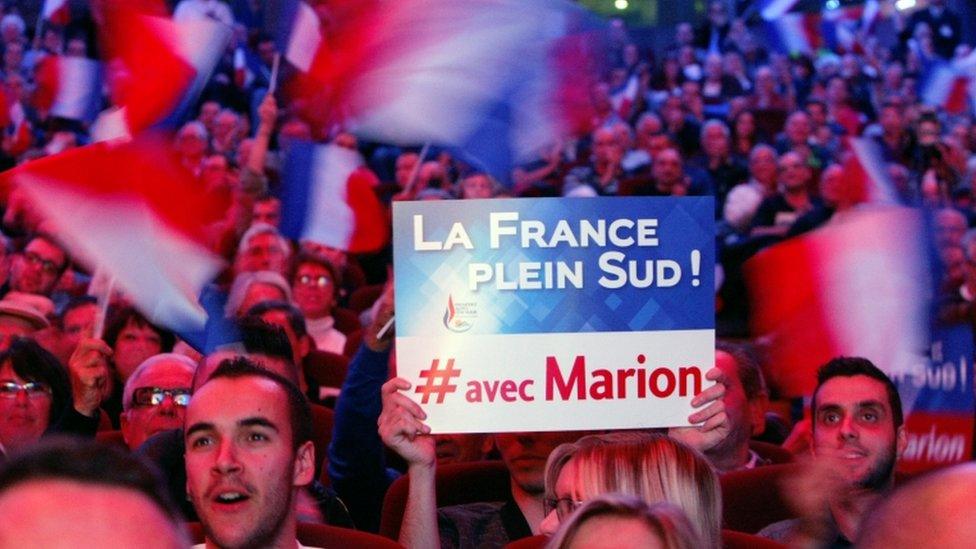French National Front defeated in bid to win regional vote
- Published
The BBC's Lucy Williamson: "Tonight France's far right fell hard"
France's far-right National Front (FN) has failed to win a single region in the second round of municipal polls.
The party was beaten into third place, despite leading in six of 13 regions in the first round of voting a week ago.
The centre-right Republicans finished ahead of President Francois Hollande's governing Socialist Party.
FN leader Marine Le Pen said that mainstream parties had colluded to keep it from power and vowed to keep on fighting.
"Nothing can stop us now," she told supporters. "By tripling our number of councillors, we will be the main opposition force in most of the regions of France."
Ms Le Pen said the party had been "disenfranchised in the most indecent of ways by a campaign of lies and disinformation".
Marine Le Pen: "Thanks and well done my dear friends for rising above the slanderous and defamatory campaigns"
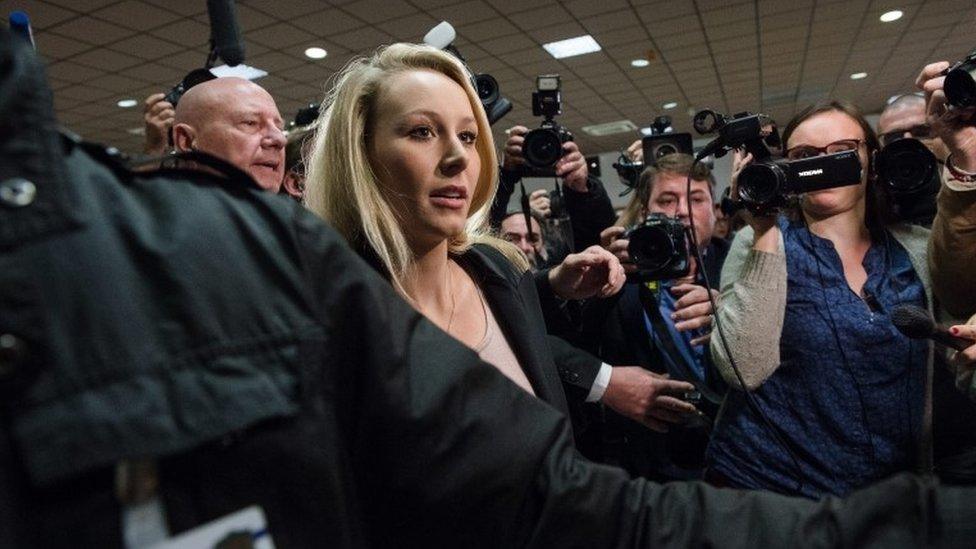
Marion Marechal-Le Pen, like her aunt, gave a defiant speech, saying "some victories shame the winners"
She had stood as a regional presidential candidate in the northern region of Nord-Pas-de-Calais-Picardie, while her niece Marion Marechal-Le Pen was the FN's candidate in the race in Provence-Alpes-Cote d'Azur, in the south.
After both led with more than 40% of the vote in the first round on 6 December, the Socialist candidates in those regions pulled out so their voters could support Republican candidates in the second round.
The FN actually increased its votes in the second round to more than 6.8 million, from 6.02 million on 6 December as more people voted, according to the ministry of the interior, external (In French). But the FN share of the vote went down slightly from 27.73% to 27.36%.

Analysis: BBC's Hugh Schofield in Paris
There can be no hiding that the results of the elections are a big personal blow to Marine Le Pen.
She has lost the chance to govern a region and show the world that her party is serious. She has been reminded that however strongly the FN performs, the gates of power remain tightly closed.
But in a way that suits her fine.
Because what it all means is that nothing in France has changed. The two main parties continue sharing out the goodies (in this case deliberately conniving to keep hers as well).
Meanwhile unemployment rises; terror stalks; the grim insurrectionary mood continues to spread.
Ms Le Pen's prospects for power may be limited, but her appeal is as strong as ever for France's growing numbers of disgruntled and disaffected.
That French "ouf" of relief? It's also the noise you make when you get a fist in the abdomen.

The Republicans increased their share from 26.65% to 40.63% and the Socialists from 23.12% to 29.14%.
The overall turnout increased from 22.6 million on 6 December to 26.2 million on Sunday. Sunday's figures are based on a count of 98% of votes so far.
In her election, Marine Le Pen secured 42.2% of the vote in the second round in her region against the centre-right's 57.8%.
Marion Marechal-Le Pen took 45.2%, compared with 54.8% for her Republican rival.
Despite the defeat, the 26-year-old urged FN supporters to "redouble our efforts".
"There are some victories that shame the winners," she said.
Xavier Bertrand, Republican regional presidential candidate in Nord-Pas-de-Calais-Picardie, said the French had given "a lesson of rallying together, courage. Here we stopped the progression of the National Front".
But Socialist Prime Minister Manuel Valls was less upbeat. He warned the "danger posed by the far right has not gone away, far from it".
The Socialists suffered a major defeat in the Paris region, Ile-de-France, which shifted to the Republicans for the first time in nearly 20 years.
Republican leader Nicolas Sarkozy said now was the time "for in-depth debates about what worries the French", noting security concerns, unemployment and frustration with the European Union.
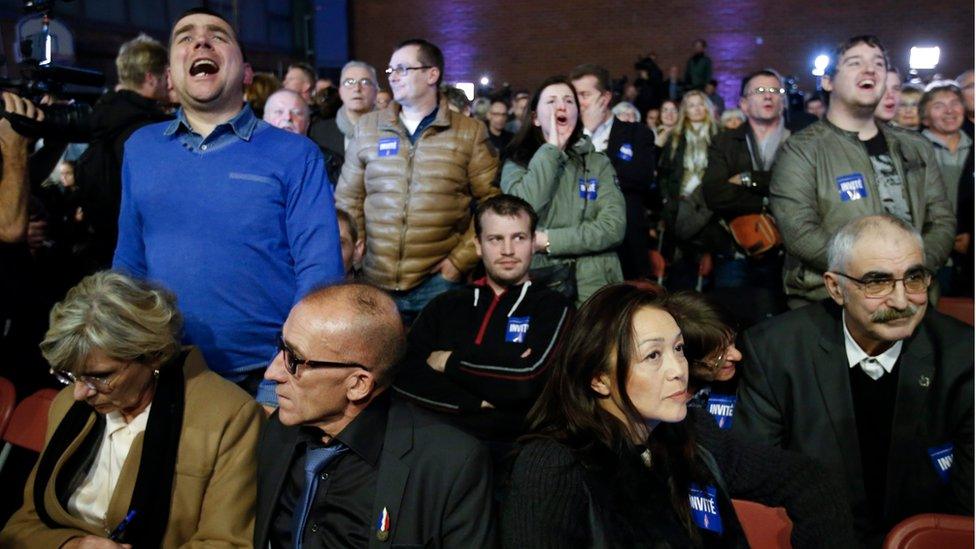
The results were a shock to FN supporters
These elections were to vote for councils and presidents of the 13 French regions, which have wide powers over local transport, education and economic development.
The Republicans won seven mainland French regions and the Socialists five, with nationalists taking Corsica.
The first round of voting gave the FN the best election results in its history.
It was the first electoral test since the 13 November Paris attacks, in which 130 people were killed - an attack claimed by the so-called Islamic State group.
In the lead-up to the first round, opinion polls suggested that the popularity of the anti-immigration, anti-EU FN had increased since the deadly attacks.
The FN had been hoping a strong performance would boost Marine Le Pen's chances in the 2017 presidential election.
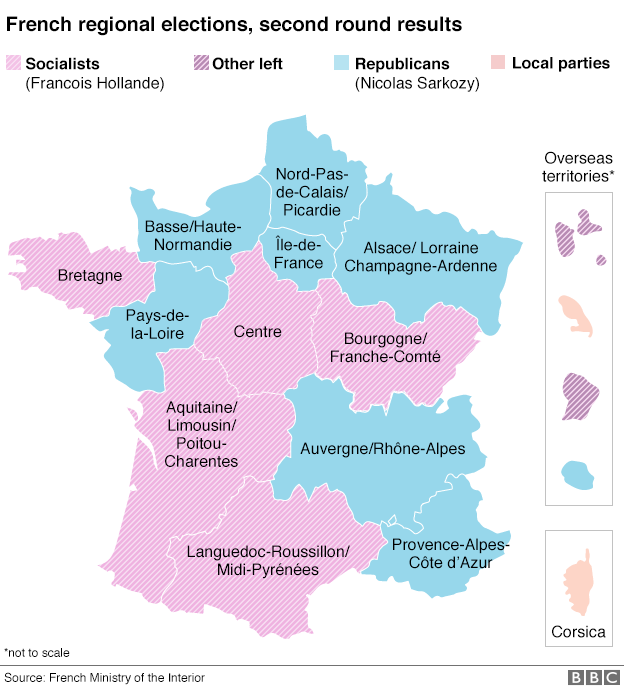
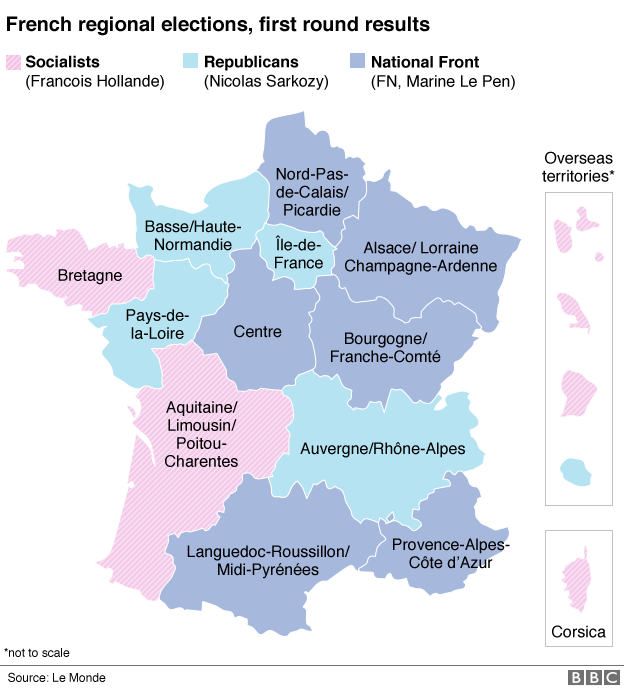

French press: National Front kept in check
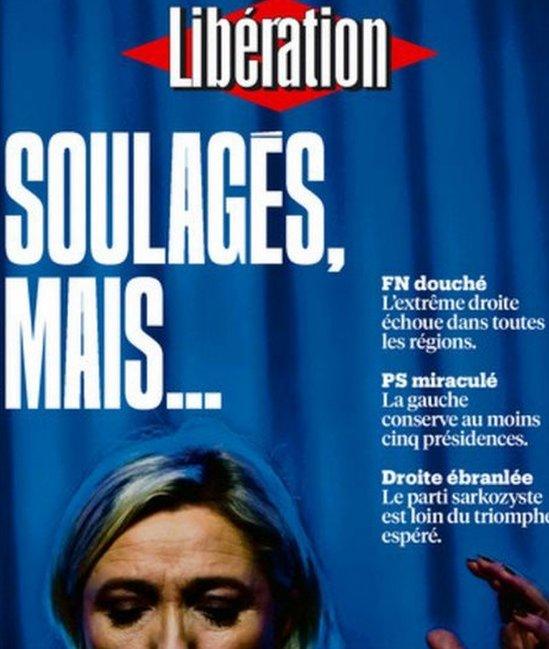
"Relieved, but…" says left-wing daily Liberation. The FN is perhaps France's first party, it says, but for the moment it is only a first-round party
Centre-left daily Le Monde says the FN was "defeated but also reinforced", while other parties had a "joyless success"
Conservative Le Figaro says the FN was held in check, and regional daily Ouest-France suggests this was only the "start of a reprieve" for the mainstream parties, given the increase in the FN vote
La Voix du Nord, which campaigned against Marine Le Pen where she lost, dubs her Republican rival's win a "modest triumph"
And Var-Matin in the south, where her niece Marion was defeated, says Republican "relief" was tempered by the fact that they "probably only won because the left stepped down"
- Published13 December 2015
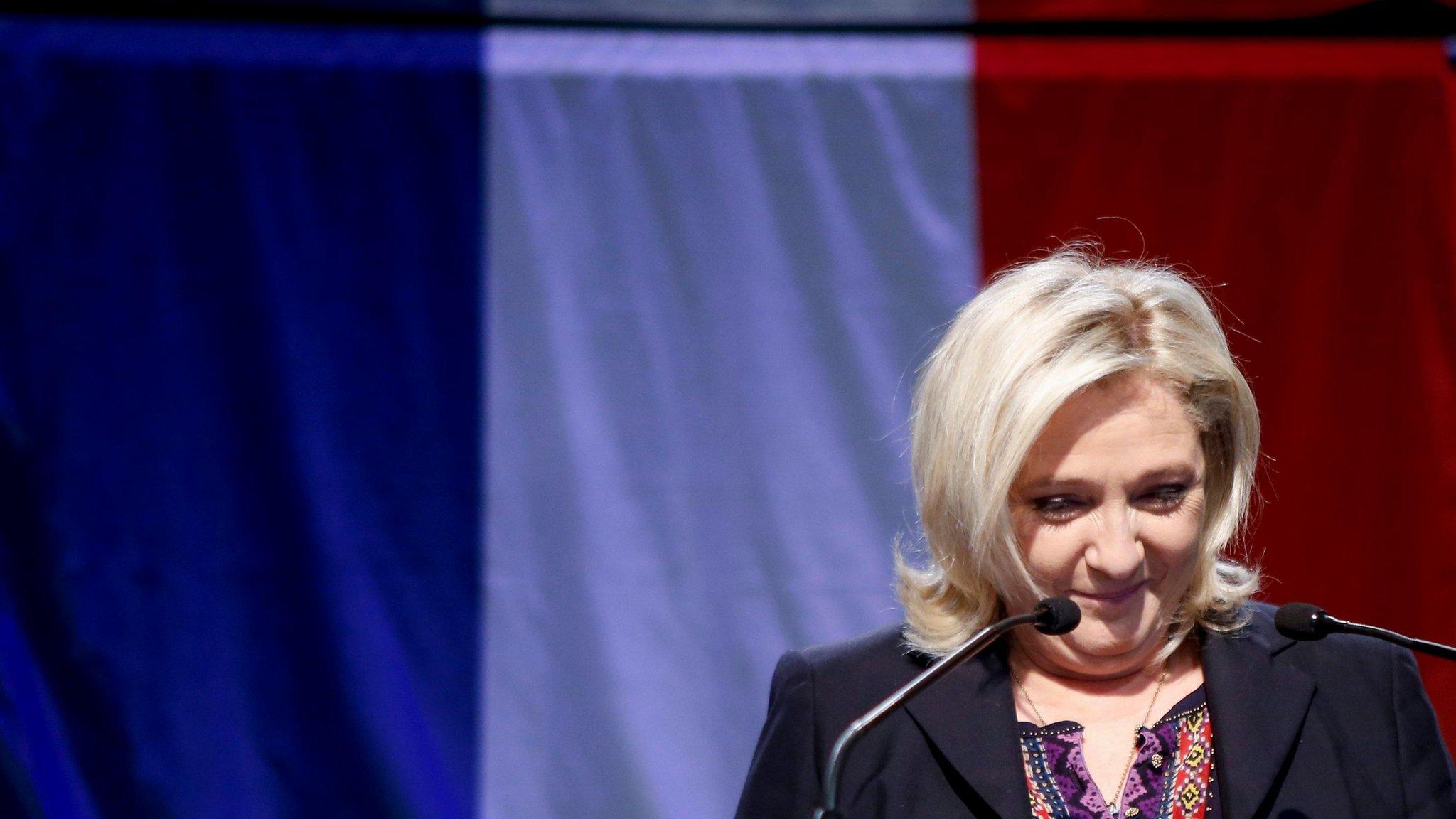
- Published7 May 2017
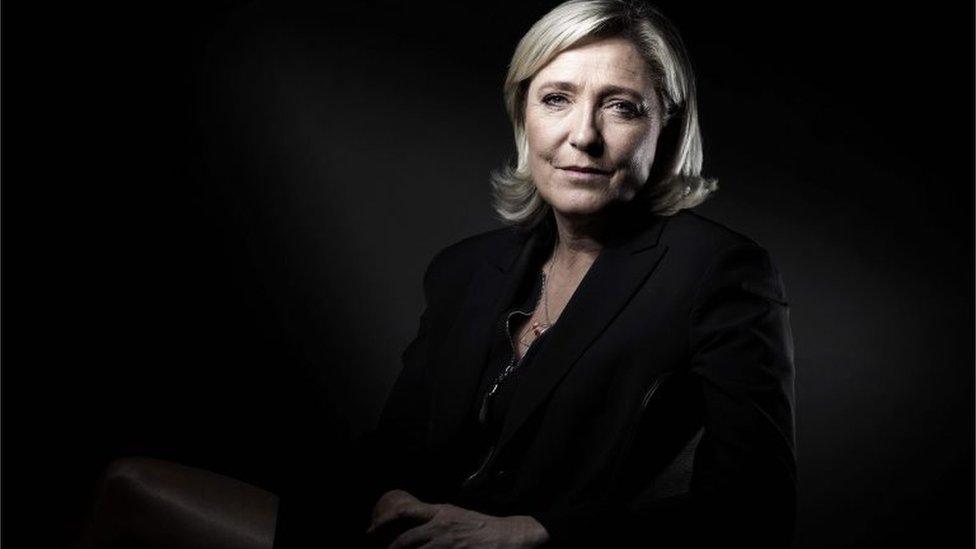
- Published7 December 2015
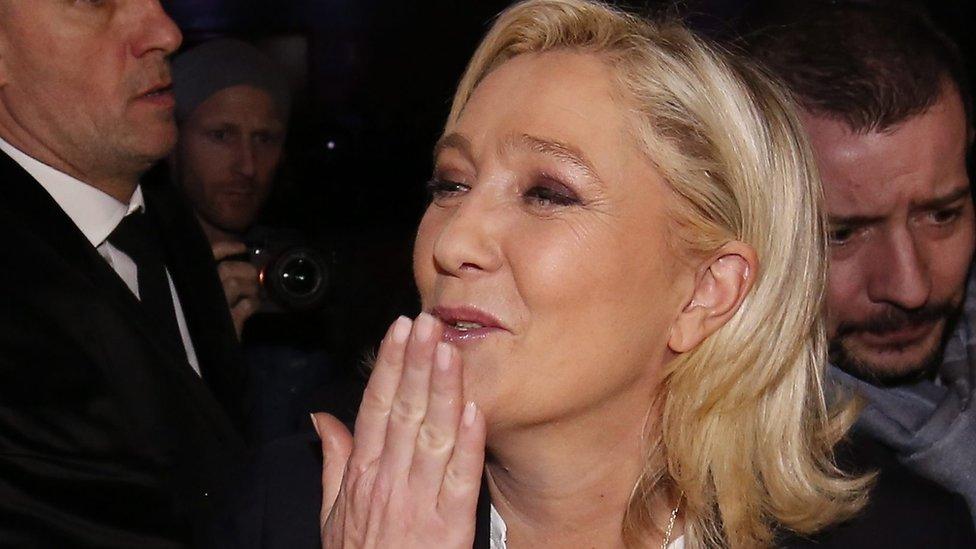
- Published5 December 2015
